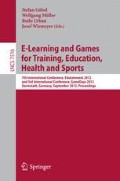Abstract
This paper introduces an approach for implementing context-sensitive user-centered scalability (CSUCS) into interactive applications using motion recognition. With scalability we refer to a system’s ability to adapt to the physical and cognitive abilities of a specific user. We discuss an adapted HAAT-model (Human Activity Assistive Technology Model) and the flow concept and show their use in two prototypical implementations: An “exergame” enriching sports exercises for the elderly and an assistive system using gamification elements to enrich the working experience of impaired and elderly persons.
Both systems have in common that they use motion detection and mechanics from game design (gamification). They transparently adapt to and visualize the users’ performance. The real-time analysis of the users’ movements is a prerequisite for the successful implementations of CSUCS.
Access this chapter
Tax calculation will be finalised at checkout
Purchases are for personal use only
Preview
Unable to display preview. Download preview PDF.
References
Anders, T.R., Fozard, J.L., Lillyquist, T.D.: Effects of Age Upon Retrieval from Short-term Memory. Developmental Psychology 6(2), 214–217 (1972)
Bailey, R.W.: Human Performance Engineering Using Human Factors/Ergonomics to Achieve Computer System Usability, 2nd edn. Prentice Hall, Englewood Cliffs (1989)
Betz, D., Cieslik, S., Dinkelacker, P., Glende, S., et al.: Grundlegende Anforderungen an AAL-Technologien und -Systeme. In: Meyer, S., Mollenkopf, H. (Hrsg.) AAL in der alternden Gesellschaft. Anforderungen, Akzeptanz und Perspektiven, Berlin, pp. 63–108 (2010)
Bogost, I.: The Rhetoric of Exergaming (2005), http://www.exergamefitness.com/pdf/The%20Rhetoric%20of%20Exergaming.pdf
Brach, M., Korn, O.: Assistive Technologies at Home and in the Workplace – A Field of Research for Exercise Science and Human Movement Science. EURAPA (European Review of Aging and Physical Activity) 9 (2012), doi:10.1007/s11556-012-0099-z
Brach, M., Hauer, K., Rotter, L., Werres, C., Korn, O., Konrad, R., Göbel, S.: Modern Principles of Training in Exergames for Sedentary Seniors: Requirements and Approaches for Sport and Exercise Science. International Journal of Computer Science in Sport (IJCSS) 11, 86–99 (2012)
Csikszentmihalyi, M., Abuhamdeh, S., Nakamura, J.: Flow. In: Elliot, A. (ed.) Handbook of Competence and Motivation, New York, USA, pp. 598–669 (2005)
Cook, A.M., Hussey, S.M.: Assistive Technologies: Principles and Practice. Mosby, St. Louis (1995)
Farrow, A., Reynolds, F.: Health and Safety of the Older Worker. Occupational Medicine 62(1), 4–11 (2012)
Freiberger, E., Sieber, C., Pfeifer, K.: Physical Activity, Exercise, and Sarcopenia - Future Challenges. Wiener Medizinische Wochenschrift 161(17-18), 416–425 (2011)
Goble, D.J., Coxon, J.P., Wenderoth, N., Van Impe, A., Swinnen, S.P.: Proprioceptive Sensibility in the Elderly: Degeneration, Functional Consequences and Plastic-adaptive Processes. Neuroscience & Biobehavioral Reviews 33(3), 271–278 (2009)
Korn, O., Schmidt, A., Hörz, T.: Assistive Systems in Production Environments: Exploring Motion Recognition and Gamification. In: Proceedings of the ACM PETRA 2012 (2012)
Korn, O.: Industrial Playgrounds. How Gamification Helps to Enrich Work for Elderly or Impaired Persons in Production. In: Proceedings of the ACM EICS 2012 (2012)
McGonigal, J.: Reality is Broken: Why Games Make Us Better and How They Can Change the World. Random House, London (2011)
Nelson, M.E., Rejeski, W.J., Blair, S.N., Duncan, P.W., Judge, J.O., King, A.C., Macera, C.A., Castanda-Sceppa, C.: Physical Activity and Public Health in Older Adults. Recommendation from the American College of Sports Medicine and the American Heart Association. Circulation 116, 1094–1105 (2007)
Shotton, J., Fitzgibbon, A., Cook, M., Sharp, T., Finocchio, M., Moore, R., Kipman, A., Blake, A.: Real-Time Human Pose Recognition in Parts from Single Depth Images. In: Proceedings of the IEEE Computer Vision and Pattern Recognition, CVPR (2011)
Steg, H., Strese, H., Loroff, C., Hull, J., Schmidt, S.: Europe is Facing a Demographic Challenge. Ambient assisted living offers solutions. Report compiled within the Specific Support Action “Ambient Assisted Living”, Berlin (2006)
Wiemeyer, J., Kliem, A.: Serious Games in Prevention and Rehabilitation – A New Panacea for Elderly People? European Review of Aging and Physical Activity 9, 41–50 (2012)
Author information
Authors and Affiliations
Editor information
Editors and Affiliations
Rights and permissions
Copyright information
© 2012 Springer-Verlag Berlin Heidelberg
About this paper
Cite this paper
Korn, O., Brach, M., Schmidt, A., Hörz, T., Konrad, R. (2012). Context-Sensitive User-Centered Scalability: An Introduction Focusing on Exergames and Assistive Systems in Work Contexts. In: Göbel, S., Müller, W., Urban, B., Wiemeyer, J. (eds) E-Learning and Games for Training, Education, Health and Sports. Edutainment GameDays 2012 2012. Lecture Notes in Computer Science, vol 7516. Springer, Berlin, Heidelberg. https://doi.org/10.1007/978-3-642-33466-5_19
Download citation
DOI: https://doi.org/10.1007/978-3-642-33466-5_19
Publisher Name: Springer, Berlin, Heidelberg
Print ISBN: 978-3-642-33465-8
Online ISBN: 978-3-642-33466-5
eBook Packages: Computer ScienceComputer Science (R0)

